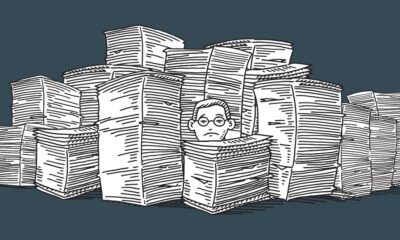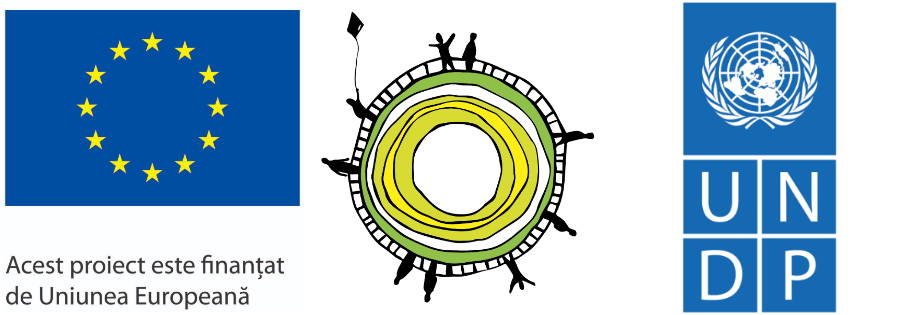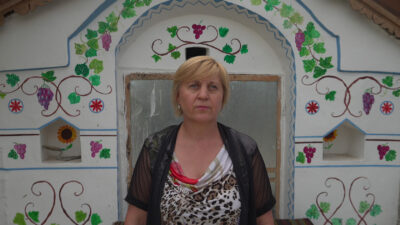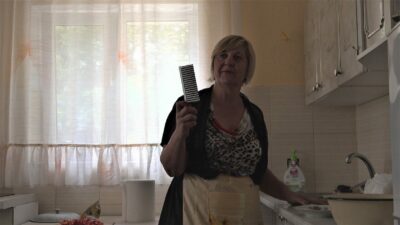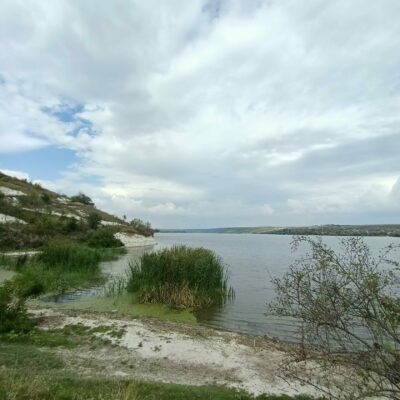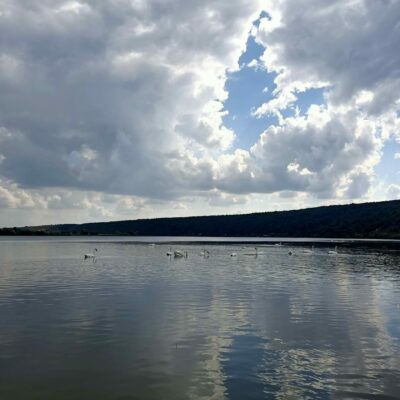

Economy
5 uncommon businesses in Moldova we bet you didn’t know about
All of them work really hard to see their dreams come true. All of them took risks when investing money, work, equipment and time into their businesses. All of them are great, representing our country and its heritage at home and abroad. There are many more unique businesses like this in Moldova. It’s just that they are not yet discovered by the public eye. For now, check out those presented below.
Biantti – ecological almonds and sea buckthorn products
Biantti is the only local producer of organic flour, cold pressed oil and almond flakes, which is certified as being ecological in the Republic of Moldova.
The owner of a 7 hectares almond orchard, a 10 hectares walnut orchard, a 5 hectares sea buckthorn orchard, as well as the producing factory is Igor Golban. He came back to Moldova after he graduated his studies in France and started the almond business in the village he was born.
By taking the technology from Germany, the planting material from Romania and accessing funds from several sources, including non-reimbursable funds, the idea of growing almonds became reality.

source: madein.md
Besides the almond and walnut oil and flour, briquettes made out of shells, sea buckthorn leaves tea, the producer sells also dried fruits, pumpkin seeds, flax, hemp and cumin oil, pumpkin, as well as flax flour.
“We have a total of 7 generations of nuts and almonds trees. Last year, we gathered 12-14 tons of almonds. This year, around 7-8 tons,” declared Igor Golban.
Only 15% of the volume of the products are exported, the rest remains in the country, being used in Moldovan kitchens.
The owners of this business – Mr. and Mrs. Malancea launched it after the retirement. The pasta and home made noodles are produced from organic ingredients. It is so good that most kindergartens and schools in the region buy pasta from the Malancea family. The couple plans also to export the goods abroad.
“80% of our production is represented by homemade noodles. Moldovans love homemade products,” said Mr. Malancea.
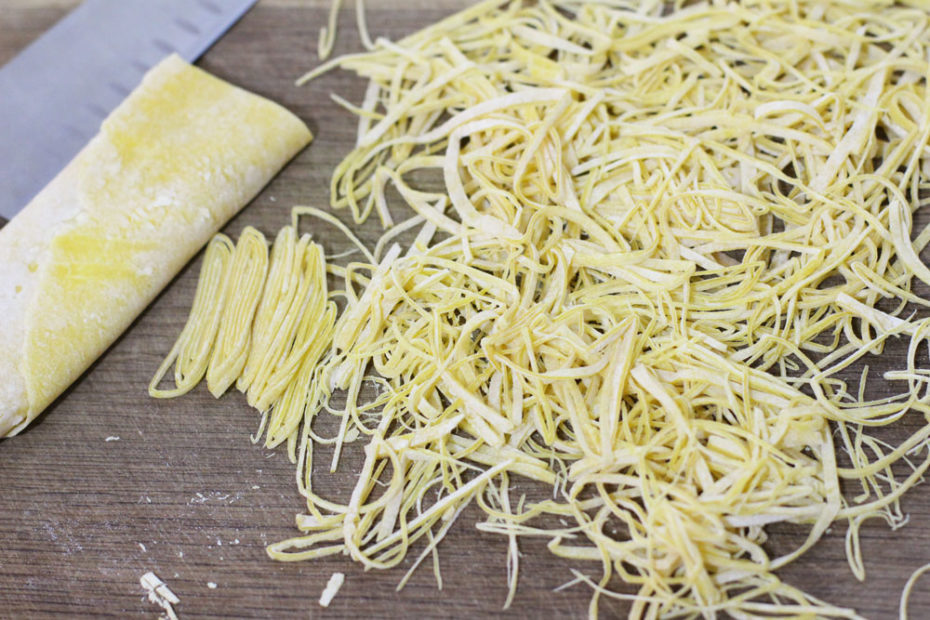
Source: masainfamilie.ro
Every day, 8 employees work at the factory in Antonești. During one day, they use at least 2000 eggs, needed in the production process. Generally, over a ton of pasta is produced in the factory for one day.
The noodles are prepared after a traditional recipe, as they are prepared at home. After the pasta and noodles are dried for 8 hours, the package process comes in place.
Still, Malancea spouses revealed that the biggest problem they have to face is the shortage of skilled labour, as a lot of such workers prefer to work abroad.
Green – handcrafted soap made of natural ingredients
Ivan Chiriac is a beekeeper who creates honey products and handmade soaps with different natural additions. He can quickly name his products’ properties and has a great passion for what he is doing.
The young man said that it all started with the purchase of the first hive. Then he took what the bees produce and managed to open a small workroom near his house, where he and his partner started to produce honey goods and natural soaps.
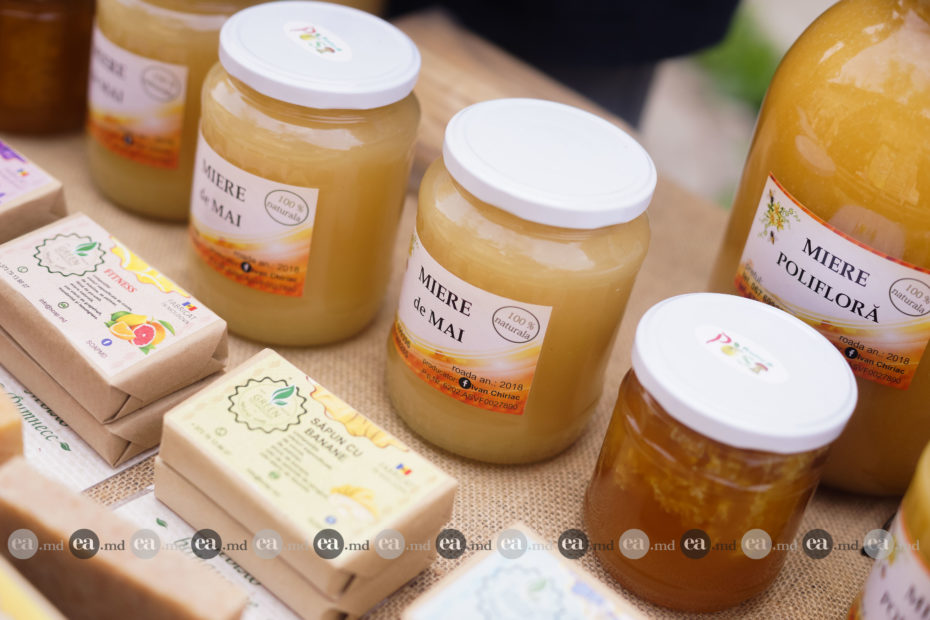
source: ea.md
“After discovering the properties of honey, I started to produce different products derived from it, such as solid shampoo and natural soaps, with various additions of plants or oils,” claimed Ivan.
The entire composition of solid shampoo and soap produced at the Ivan’s workroom is based on natural products, such as vegetable oils, seeds, honey, everything being indicated on the label.
Brânza de Popeasca – a unique kind of cheese protected by the European Commision
About Cheese from Popeasca we already wrote in a previous article. It is one of the few authentic products from Moldova that were qualified as products with a protected designation of origin. Once it obtained such a labelling, it can no longer be manufactured according to the same recipe and the same name anywhere in the world. “Brânza de Popeasca” is a cheese made with different additional ingredients like dill, parsley, olives, bell pepper and other kinds of cheese.
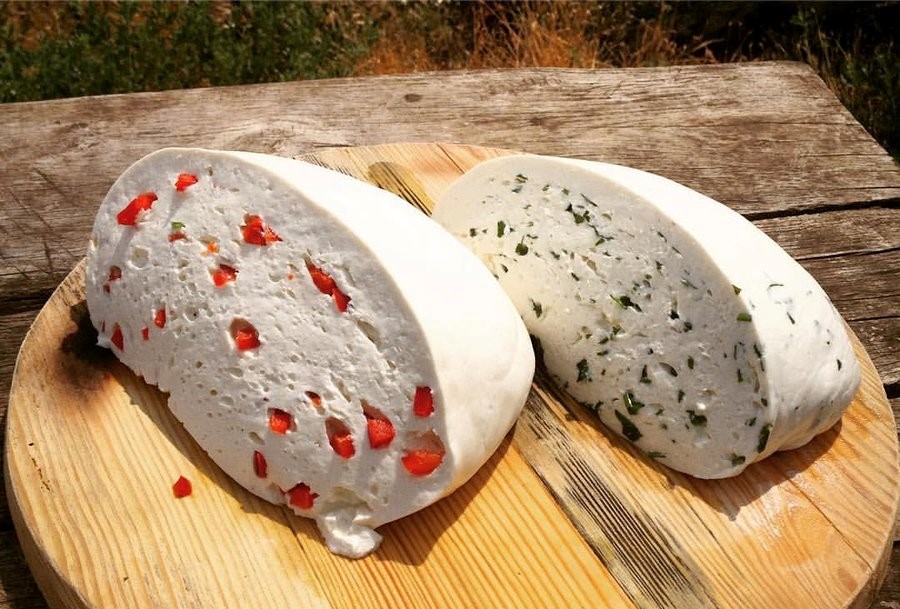
source: moldnova.eu
Vadim and Mariana Osipov are the households that manage a farm of 200 heads. Their customers are several restaurants and supermarkets in Chișinău. These people face daily a lot of difficulties, from human factor to climatic conditions. Despite all the hardships, they never give up and continue to work for developing their business and taking it to a new stage.
FROM THE HEART.SHOP – the online shop where only Moldovan goods are sold
FROM THE HEART.SHOP aimed to be the first online store in the Republic of Moldova where products manufactured and created in Moldova were collected in one place. It was set out to create a bridge between Moldovan producers and consumers, wherever they are, as it facilitated the online purchase of the goods desired and their delivery in any corner of the world.
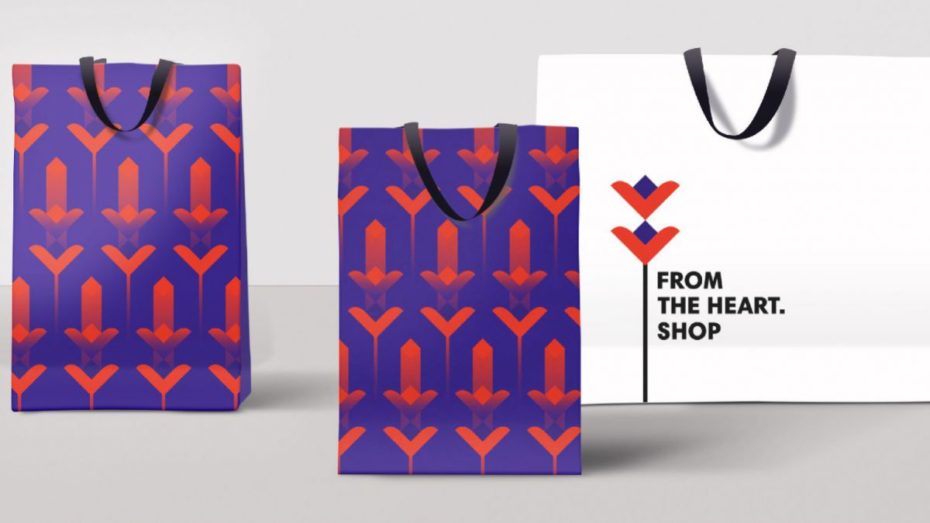
source: fromtheheart.shop
The online platform was founded by a group of enthusiastic people led by Nata Albot, a blogger, TV producer, journalist and a media manager from Moldova.
There online shop sells all kinds of clothing products, shoes, cosmetics, accessories, books and household items from 28 Moldovan brands and there is still room for more.
Photo: Getty Images (Opolja)
Society
“They are not needy, but they need help”. How Moldovan volunteers try to create a safe environment for the Ukrainian refugees

At the Government’s ground floor, the phones ring constantly, the laptop screens never reach standby. In one corner of the room there is a logistics planning meeting, someone has a call on Zoom with partners and donors, someone else finally managed to take a cookie and make some coffee. Everyone is exhausted and have sleepy red eyes, but the volunteers still have a lot of energy and dedication to help in creating a safe place for the Ukrainian refugees.
“It’s like a continuous bustle just so you won’t read the news. You get home sometimes and you don’t have time for news, and that somehow helps. It’s a kind of solidarity and mutual support,” says Vlada Ciobanu, volunteer responsible for communication and fundraising.
The volunteers group was formed from the very first day of war. A Facebook page was created, where all types of messages immediately started to flow: “I offer accommodation”, “I want to help”, “I want to get involved”, “Where can I bring the products?”, “I have a car and I can go to the customs”. Soon, the authorities also started asking for volunteers’ support. Now they all work together, coordinate activities and try to find solutions to the most difficult problems.
Is accommodation needed for 10, 200 or 800 people? Do you need transportation to the customs? Does anyone want to deliver 3 tons of apples and does not know where? Do you need medicine or mobile toilets? All these questions require prompt answers and actions. Blankets, sheets, diapers, hygiene products, food, clothes – people bring everything, and someone needs to quickly find ways of delivering them to those who need them.
Sometimes this collaboration is difficult, involves a lot of bureaucracy, and it can be difficult to get answers on time. “Republic of Moldova has never faced such a large influx of refugees and, probably because nobody thought this could happen, a mechanism of this kind of crisis has not been developed. Due to the absence of such a mechanism that the state should have created, we, the volunteers, intervened and tried to help in a practical way for the spontaneous and on the sport solutions of the problems,” mentions Ecaterina Luțișina, volunteer responsible for the refugees’ accommodation.
Ana Maria Popa, one of the founders of the group “Help Ukrainians in Moldova/SOS Українці Молдовa” says that the toughest thing is to find time and have a clear mind in managing different procedures, although things still happen somehow naturally. Everyone is ready to intervene and help, to take on more responsibilities and to act immediately when needed. The biggest challenges arise when it is necessary to accommodate large families, people with special needs, for which alternative solutions must be identified.
Goods and donations
The volunteers try to cope with the high flow of requests for both accommodation and products of all kinds. “It came to me as a shock and a panic when I found out that both mothers who are now in Ukraine, as well as those who found refuge in our country are losing their milk because of stress. We are trying to fill an enormous need for milk powder, for which the demand is high and the stocks are decreasing”, says Steliana, the volunteer responsible for the distribution of goods from the donation centers.
Several centers have been set up to collect donations in all regions of Chisinau, and volunteers are redirecting the goods to where the refugees are. A system for processing and monitoring donations has already been established, while the volunteer drivers take over the order only according to a unique code.
Volunteers from the collection centers also do the inventory – the donated goods and the distributed goods. The rest is transported to Vatra deposit, from where it is distributed to the placement centers where more than 50 refugees are housed.
When they want to donate goods, but they don’t know what would be needed, people are urged to put themselves in the position of refugees and ask themselves what would they need most if they wake up overnight and have to hurriedly pack their bags and run away. Steliana wants to emphasise that “these people are not needy, but these people need help. They did not choose to end up in this situation.”
Furthermore, the volunteer Cristina Sîrbu seeks to identify producers and negotiate prices for products needed by refugees, thus mediating the procurement process for NGOs with which she collaborates, such as Caritas, World Children’s Fund, Polish Solidarity Fund, Lifting hands, Peace Corps and others.
One of the challenges she is facing now is the identifying a mattress manufacturer in the West, because the Moldovan mattress manufacturer that has been helping so far no longer has polyurethane, a raw material usually imported from Russia and Ukraine.
Cristina also needs to find solutions for the needs of the volunteer groups – phones, laptops, gsm connection and internet for a good carrying out of activities.
Hate messages
The most difficult thing for the communication team is to manage the hate messages on the social networks, which started to appear more often. “Even if there is some sort of dissatisfaction from the Ukrainian refugees and those who offer help, we live now in a very diverse society, there are different kind of people, and we act very differently under stress,” said Vlada Ciobanu.
Translation by Cătălina Bîrsanu
Culture
The village of the first astronomer in the Republic of Moldova

Culture
Vîșcăuți, the Moldovan village where you feel like heaven
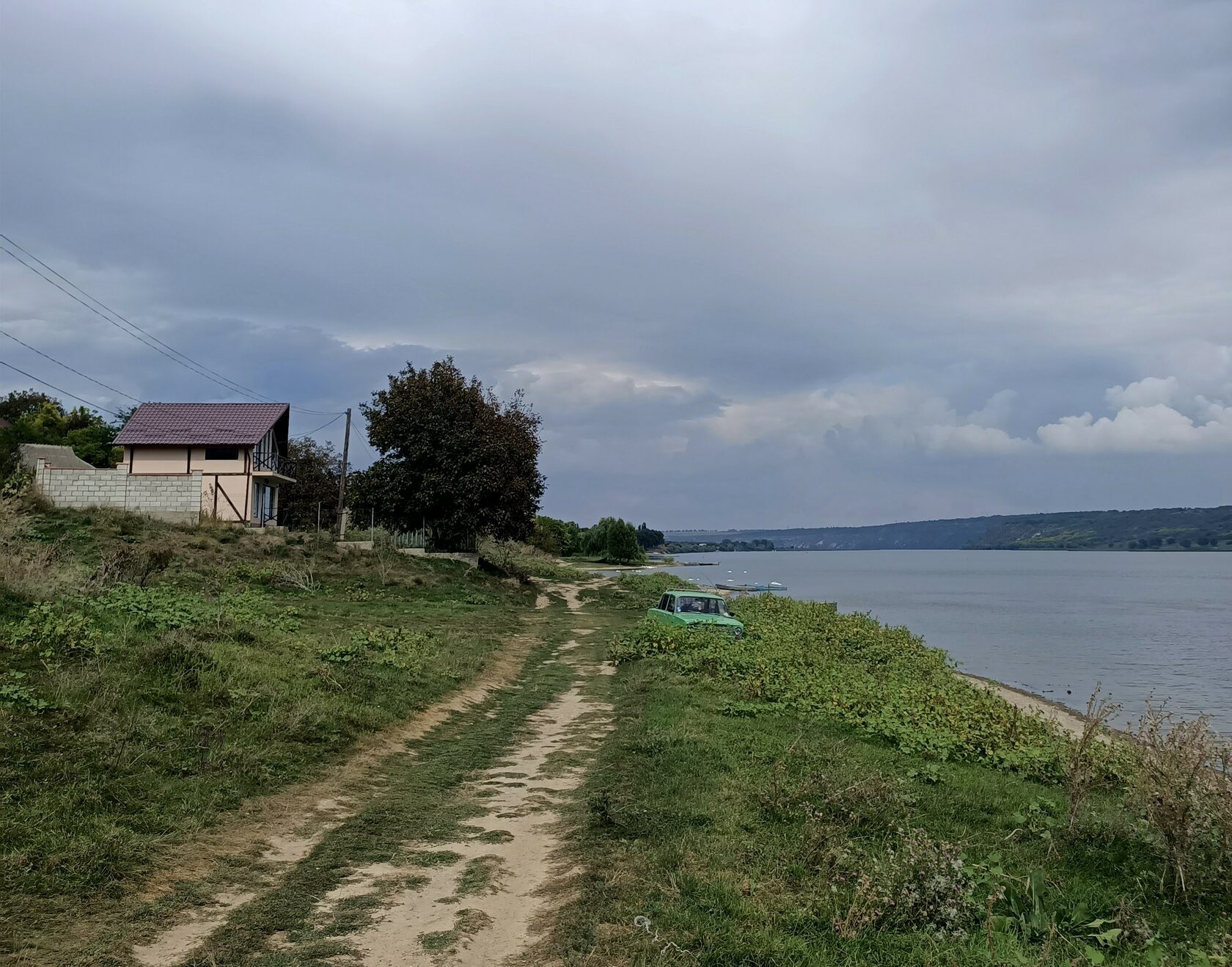
Reading Time: 9 minutesShe enters the house in a hurry and arranges the corner of the entrance mat. She leaves her purse and other items on the kitchen chair and starts washing the dishes. Then she goes to the second floor, changes the sheets on the beds, arranges the trinkets on the table, draws the curtains and opens the windows to aerate the room. From the window you can see the Nistru river, its banks covered with fresh vegetation. The woman sees to her tasks. She vacuums, she cleans the floors and starts all over again on the first floor.
Then she moves to the old house next door. Nobody was accommodated in this house yet, as everyone prefers “euro” repairs, as Lucia, the 52 years old administrator of the guest house, explains. But she doesn’t let the dust settle on the furniture and always has the rooms ready to accommodate guests.
The House of the Boyar is a guest house in the village of Vîșcăuți, Orhei, and can accommodate up to 8 persons. It is part of an eco-cultural touristic project “Bronze Half-moon” (“Semiluna de bronz”), which aims at attracting tourists in rural regions, offering them authentic experience, but it also promotes social entrepreneurship.
Besides involving the locals by creating jobs, the project also offers the opportunity and necessary support for the villagers to sell their products and services. Also, the profit is reinvested in the locality and its development. For example, now they work on developing a touristic trail through the forests of Vîșcăuți with all the necessary infrastructure, which will benefit the visitors of the village, as well as the locals.











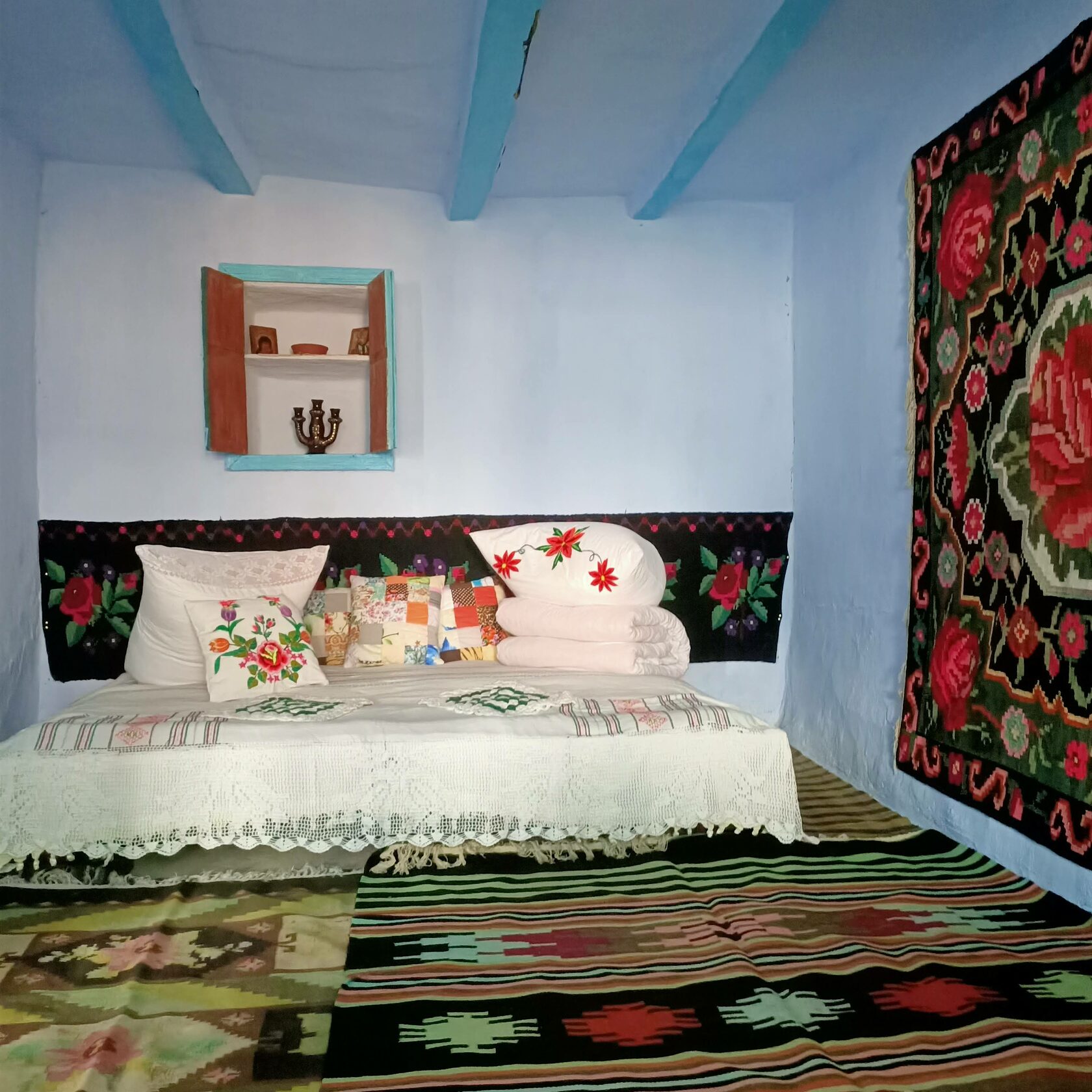
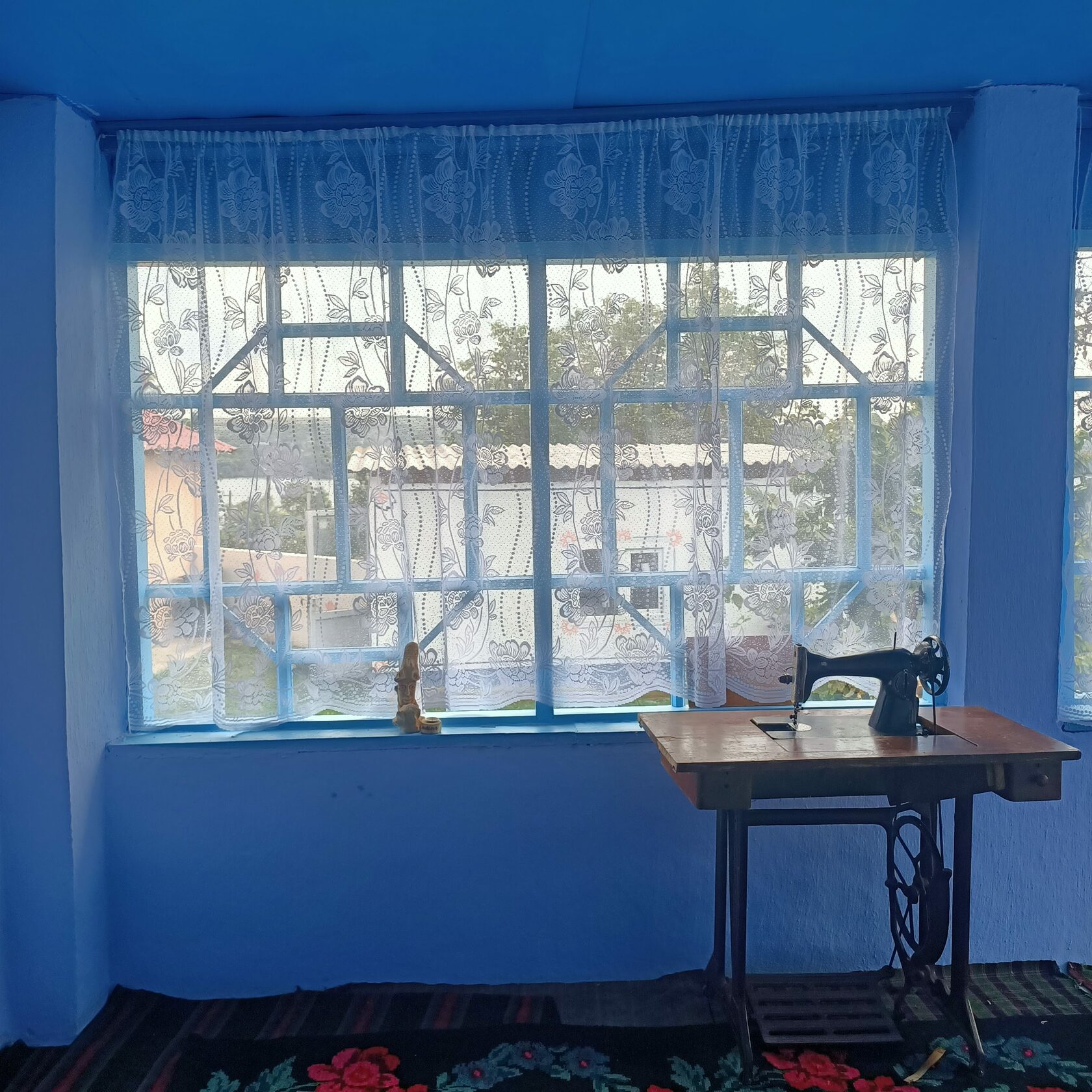
Lucia quickly sweeps in the yard and takes out the trash. She managed to tidy up in just about two hours. A group of tourists just left and another one is coming. Lucia Frunză took off her apron and is ready to welcome the guests. “They come from Chișinău, they come from everywhere,” she says in a hurry.
Lucia remembers when she received a group of 18 people. At their request, she cooked them plăcinte, pot roast and mămăligă. But she decided to make them a surprise and prepared some mulled wine. “As a bonus. I have a special recipe. I add black pepper, sugar, lemon, oranges and a little vanilla. These give the wine such an arooomaaa.”
She is a very good cook. And one of her secrets is a special knife, which she carries with her from home to the guest house and back. It’s a cleaver with a wavy pattern blade, so when she cuts produce, it has jagged edges. When she makes soup, she cuts the potatoes, the carrots, the meat and the onion – she slices everything with it. Once she brought a bowl of soup to uncle Colea. “Oh, this soup with farfalle is so good, it’s like at a restaurant!,” recalls Lucia amused about the impression she made on the neighbor.
The meadow and the cave
Gheorghe and Ludmila Frunză live down the road from the guest house. When Lucia has too much on her plate, the old couple helps her out with cooking or with laundry. He is 74 years old, and she is 70. In summertime, the couple spends their second youth in Vîșcăuți. In winter, when it’s cold, they go back to Chișinău.
Gheorghe was born here, and he knows all the surroundings like his five fingers. He knows how to reach the Boyar’s Cave two ways: one is more difficult and the other one easier.
If you are in good shape and have the courage, you can reach the Boyar’s Cave through the ravine. But Gheorghe’s legs can’t keep up with this trail as he used to. The pathway to the cave goes between two rocky hills. You will step on the slippery rocks, washed by the cold water of the springs. You will climb the trees so thick, you can’t embrace with both hands, knocked down by the summer rain.
You will slowly advance towards the cave located up the hill, where you’ll see the Cornelian cherry dogwood full of hard-to-reach red berries, which local people pick for making compote. If you try and yell between the two rocky hills, your voice will not travel far. You will have no use of modern technologies, and your phone will only be good for taking pictures. Here you can breathe fresh cold air, while embraced by the silence dictated only by the murmur of the water.
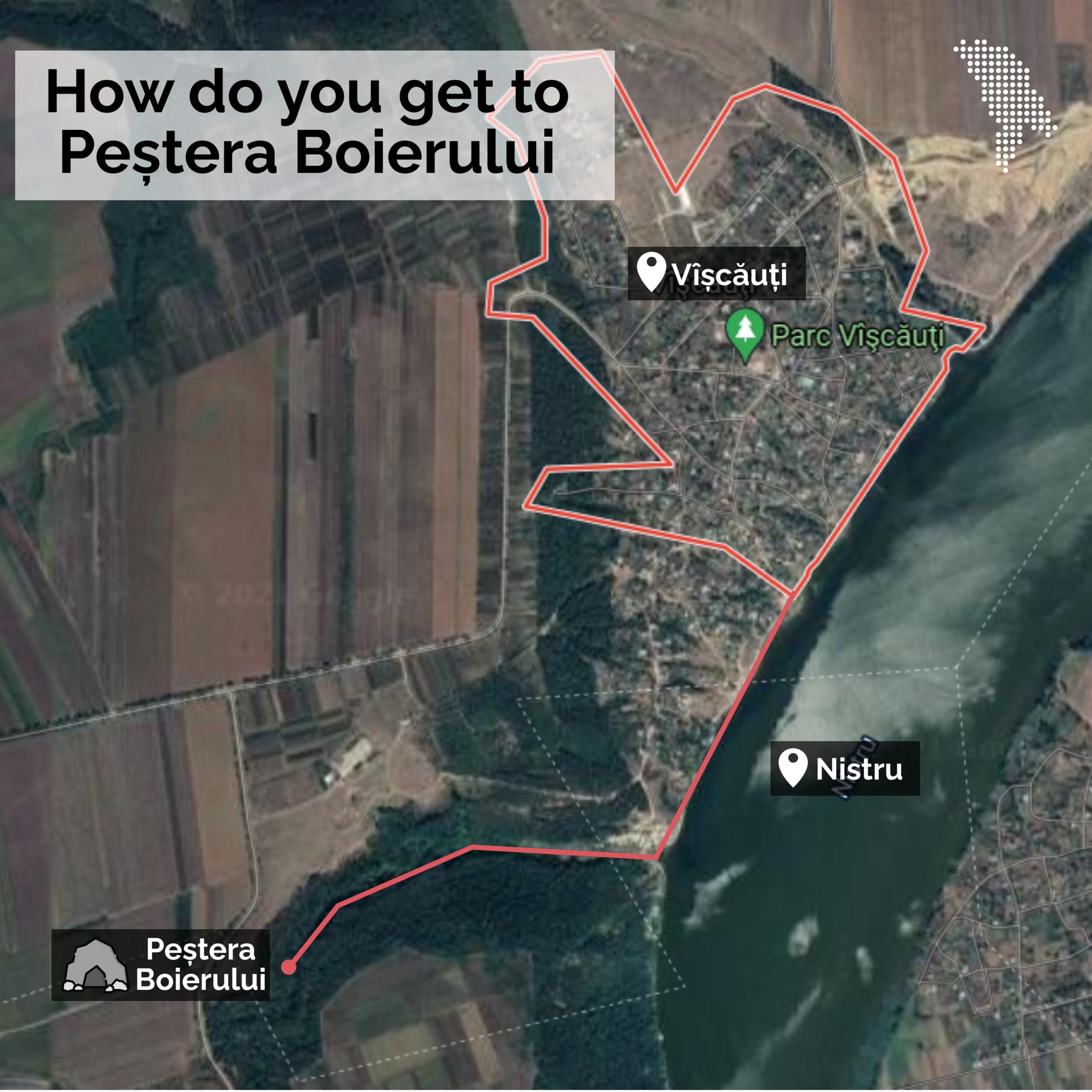
Once you reach the cave, you need a lantern. On the walls you can see “V+M=LOVE”, but also hanging bats – almost embraced one next to another. There are three entrances to the cave and many labyrinths. No one knows exactly what are its measurements. There are some assumptions that it’s one kilometer long. But you can’t really reach its depths, because it collapsed a long time ago.
There are many legends about the origin of the cave. Gheorghe tells us that it used to be a quarry, tons of rock being extracted for the construction of churches.
Actually, according to archives, the cave was dug by the Sandino boyar around 1900 for storing wine barrels.
Locals say that during the two world wars, the cave was used as shelter for their grandparents and great-grandparents, and that they were guarded by the soldiers stationed in Vîșcăuți.
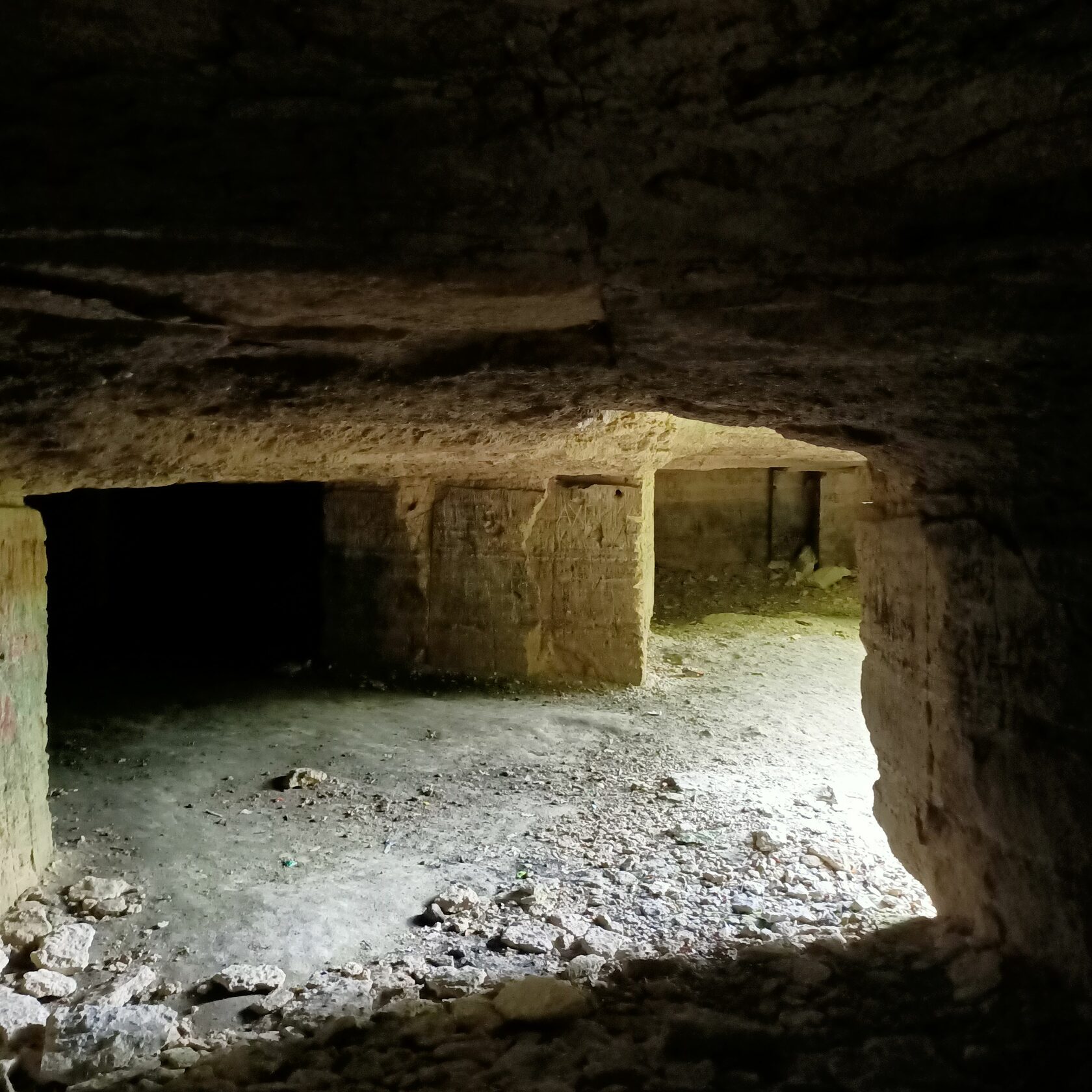
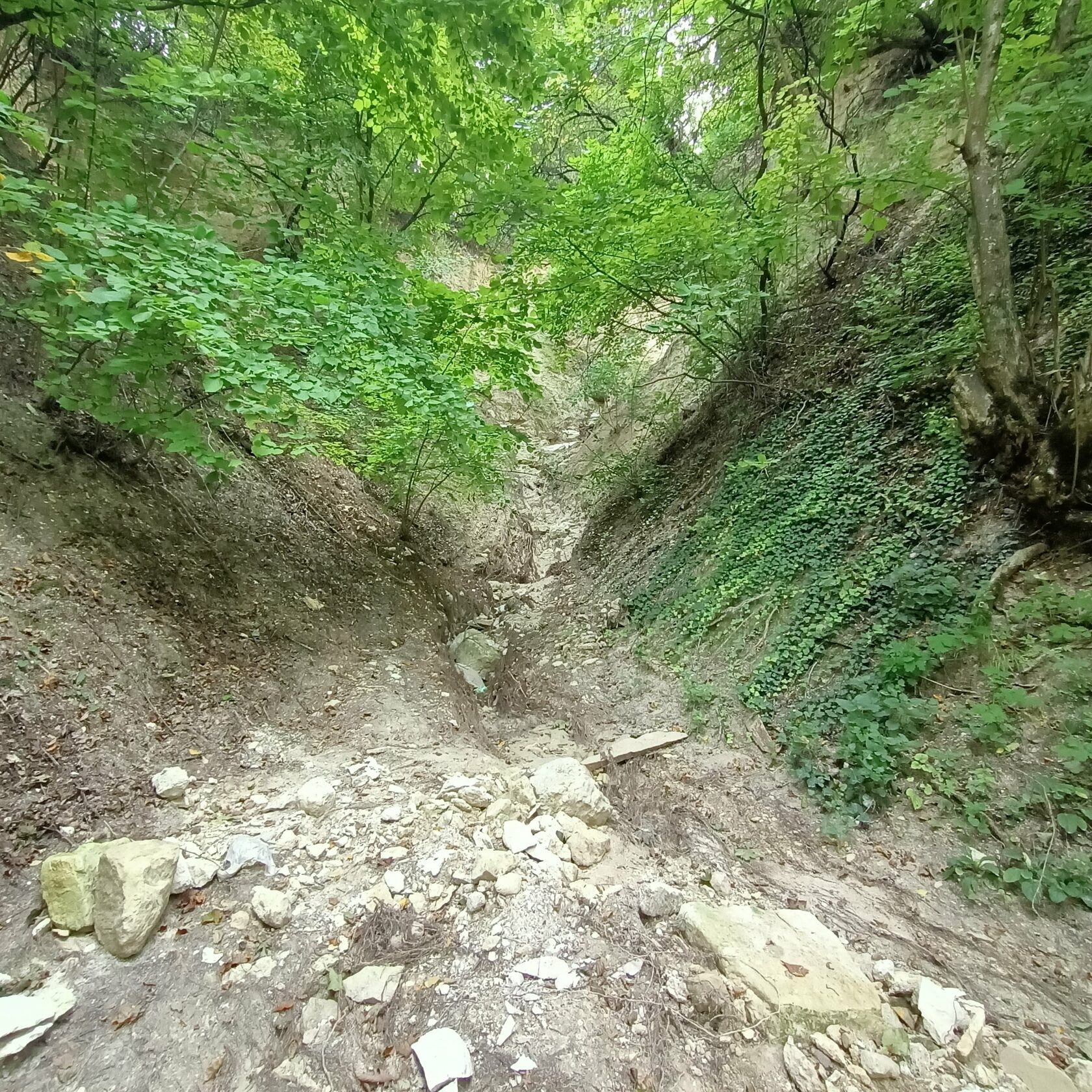
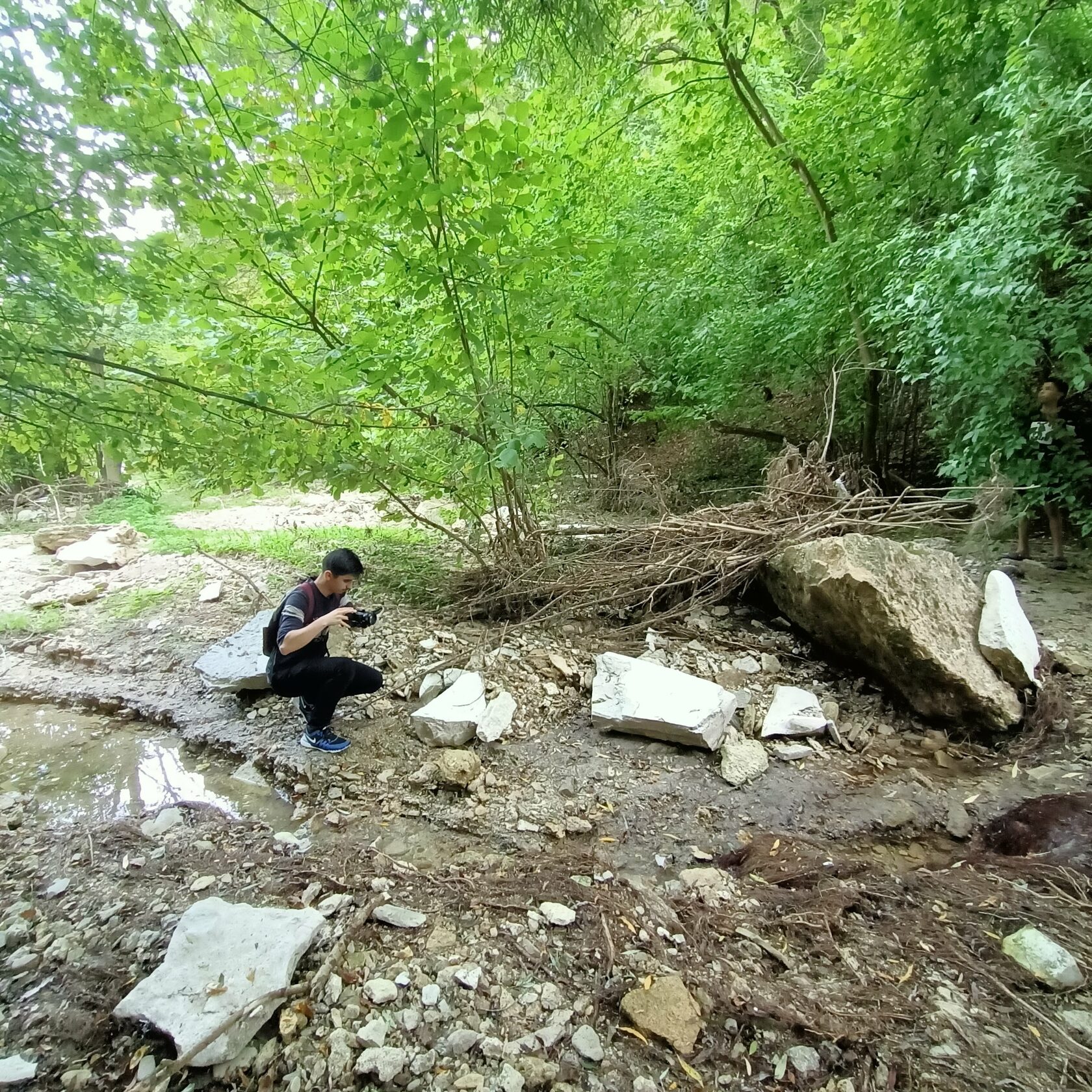
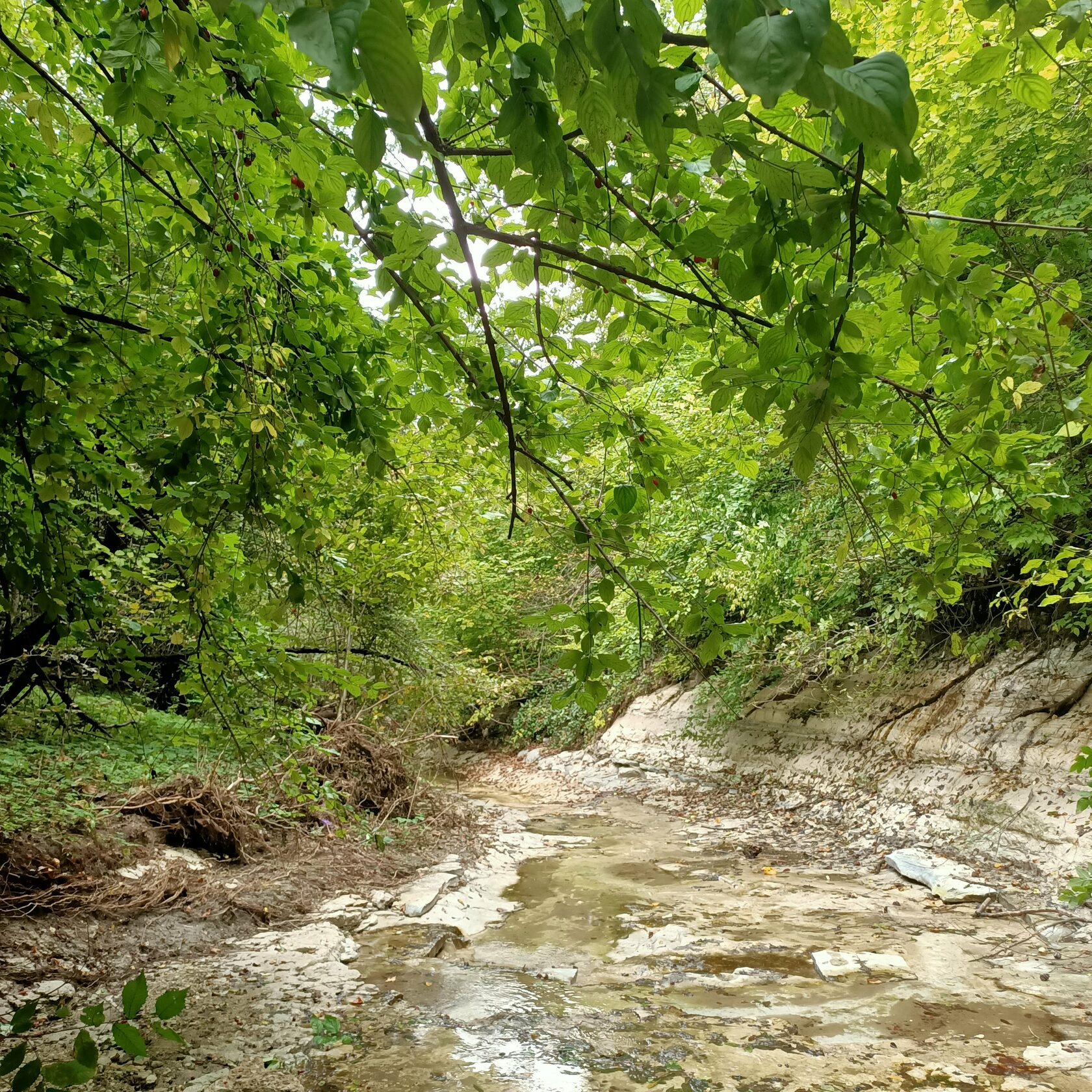
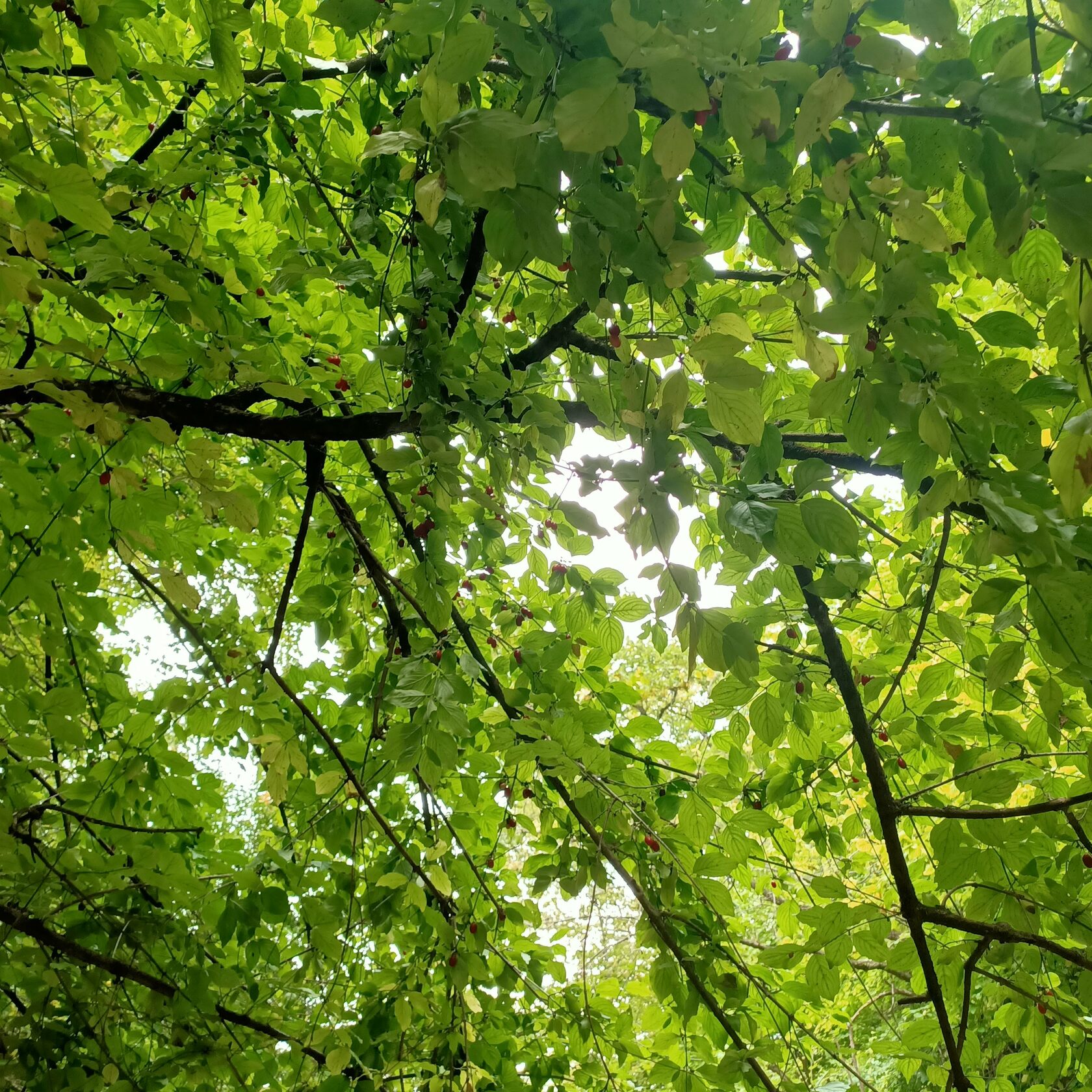
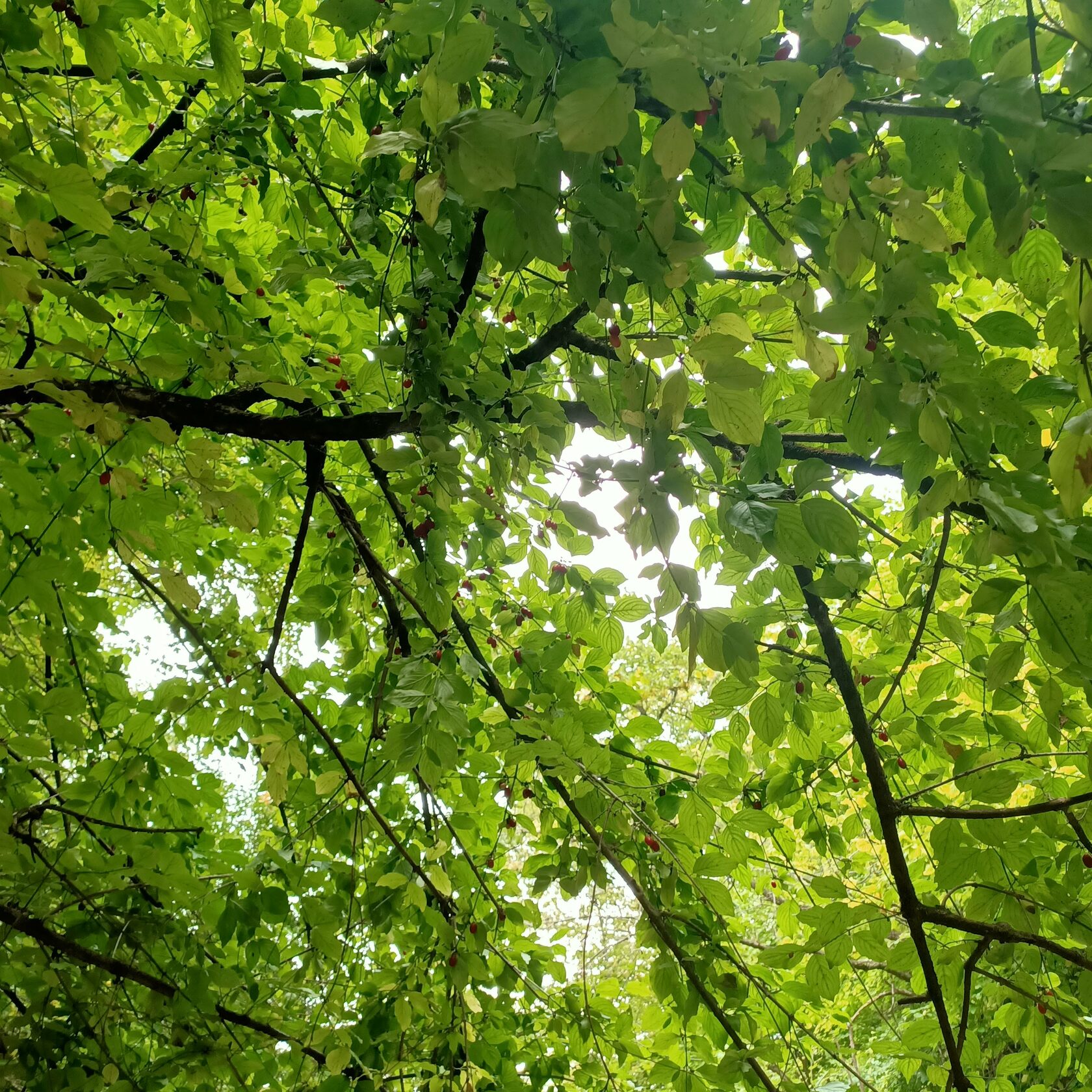
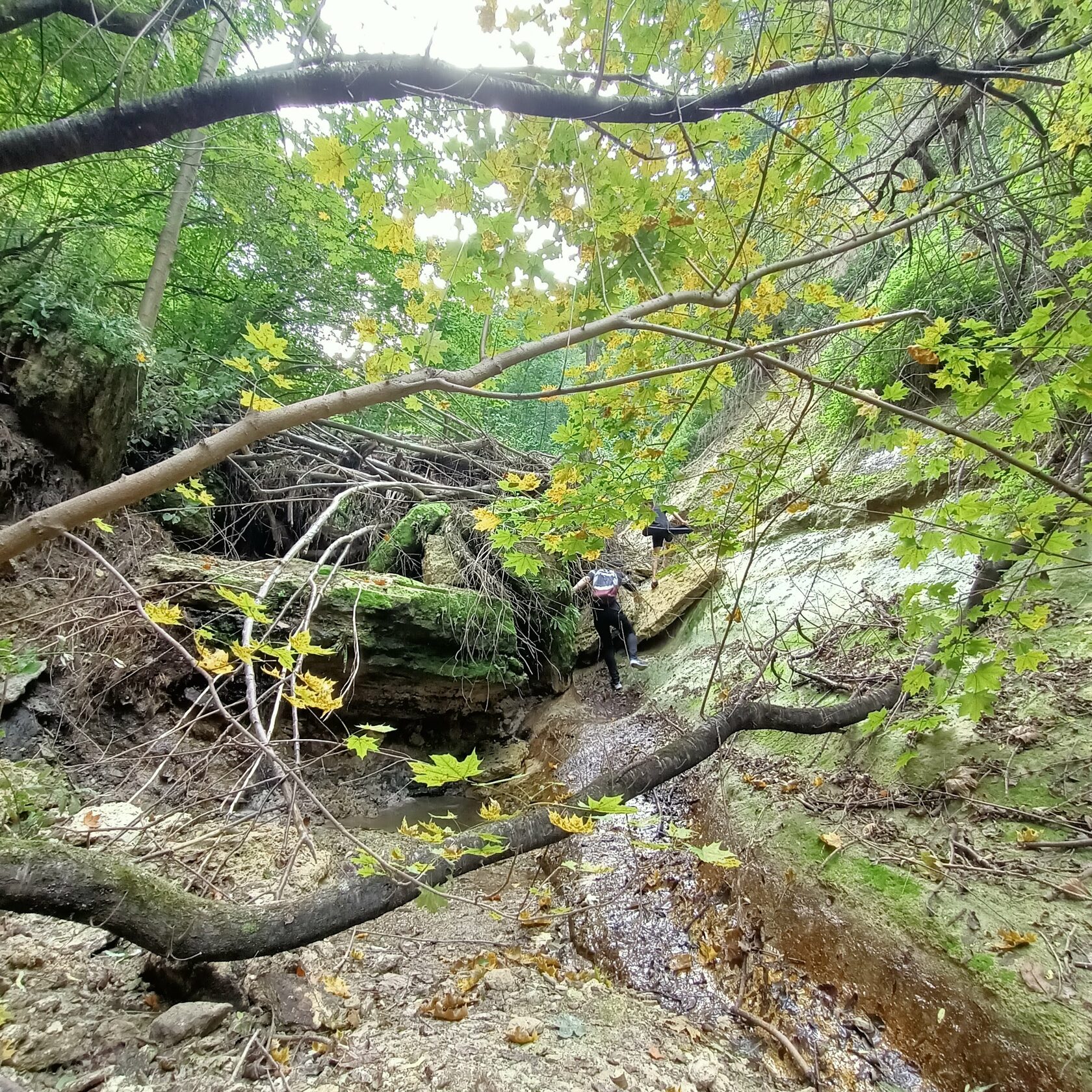
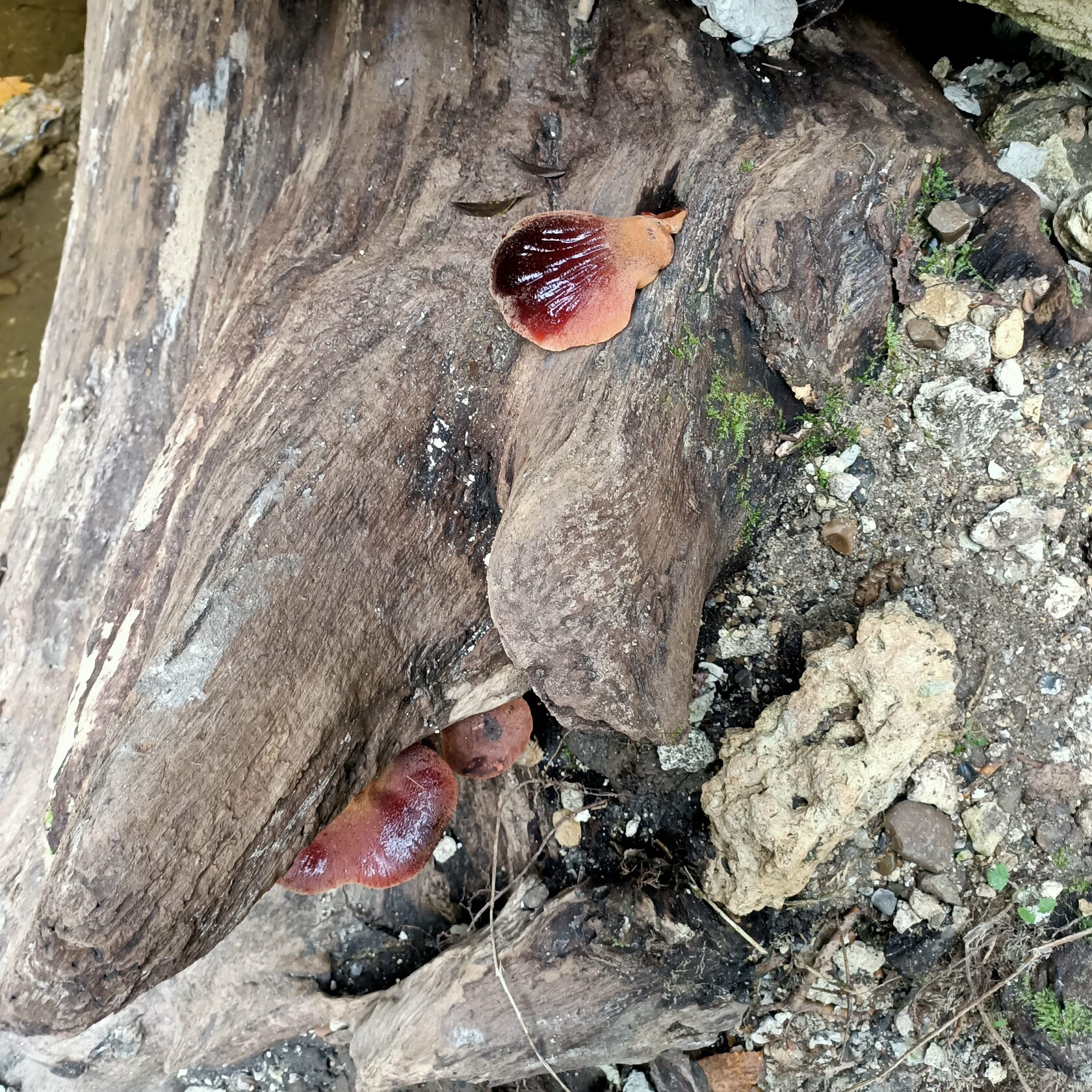
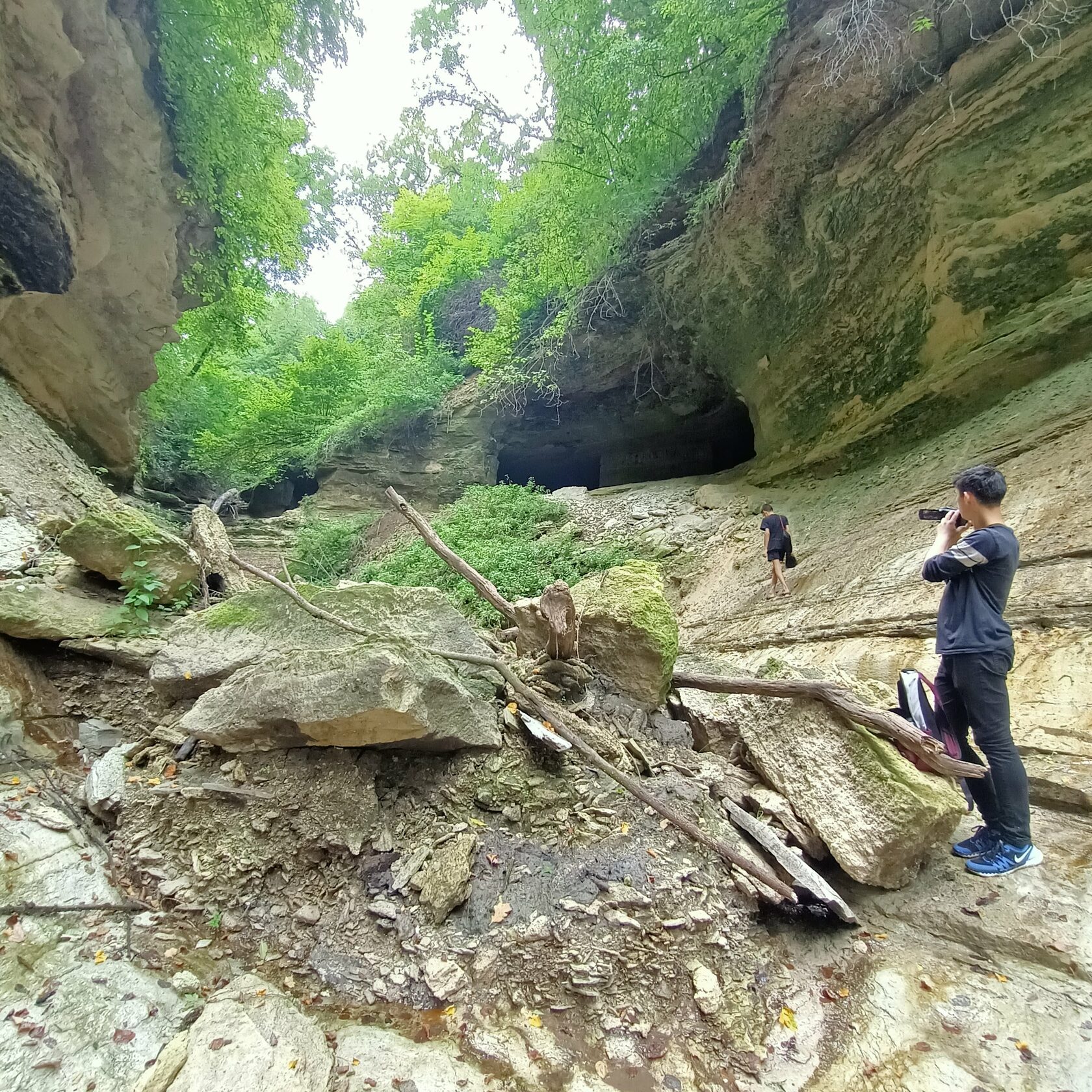
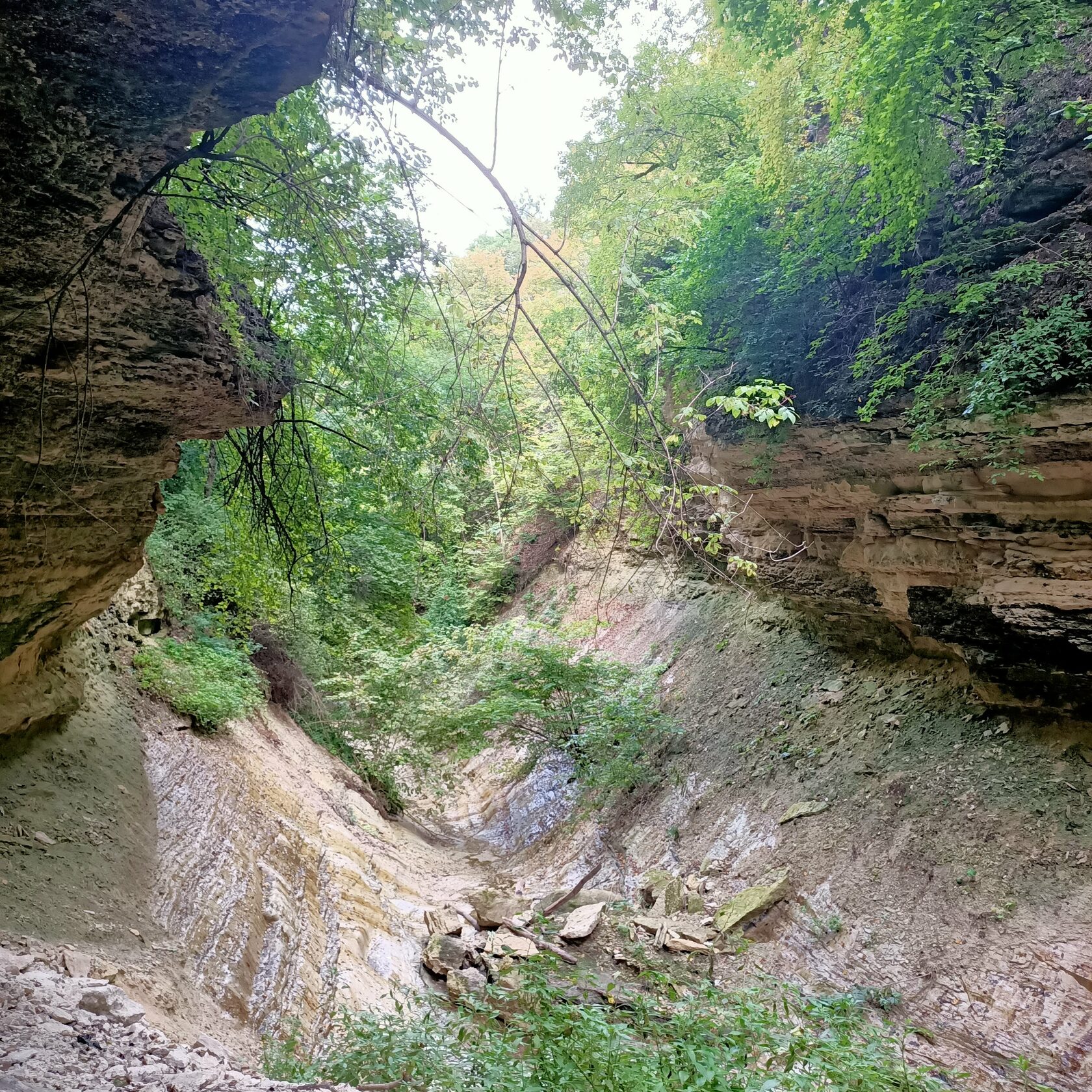
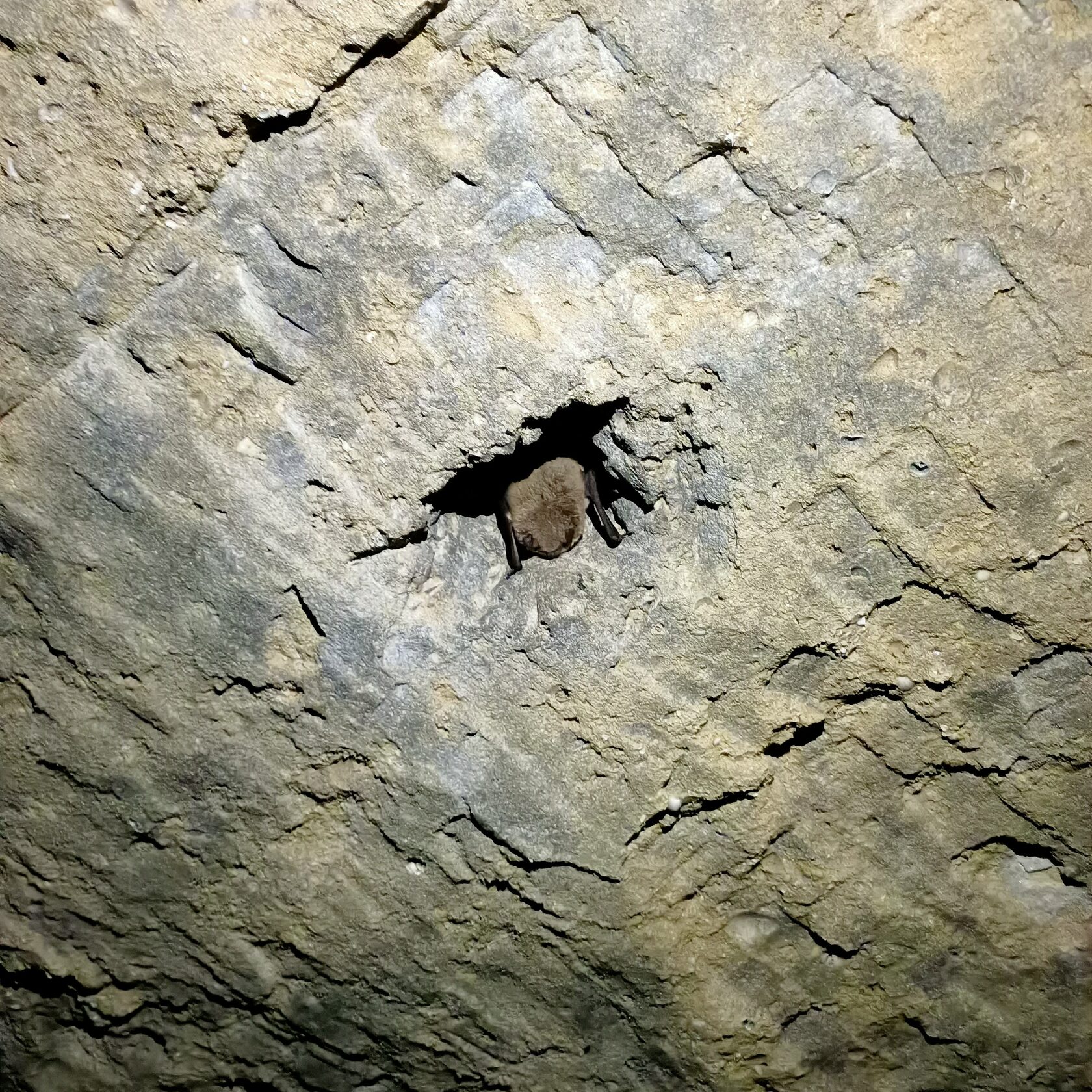
The old couple takes us on the river bank. “If you get on the boat and sail on the river, watching the forest… It’s such a beauty!,” Gheorghe tells us with excitement. He walks slowly and looks towards Nistru, watching the swans, the forest. “The air in Vîșcăuți almost makes you drunk,” he adds. He is followed by his wife Liuda and Daniel, a boy from the neighborhood.
They want to visit the three springs. It is said that the water of each of the springs has distinctive tastes. When they get to the place, they can see tourists’ traces: campfire ash, some pieces of paper. Tourists are not uncommon in these places. Gheorghe tells us that they come with their tents and spend a couple of days here fishing. He likes spending time with them. “All of them say that this is a nice quiet place”.
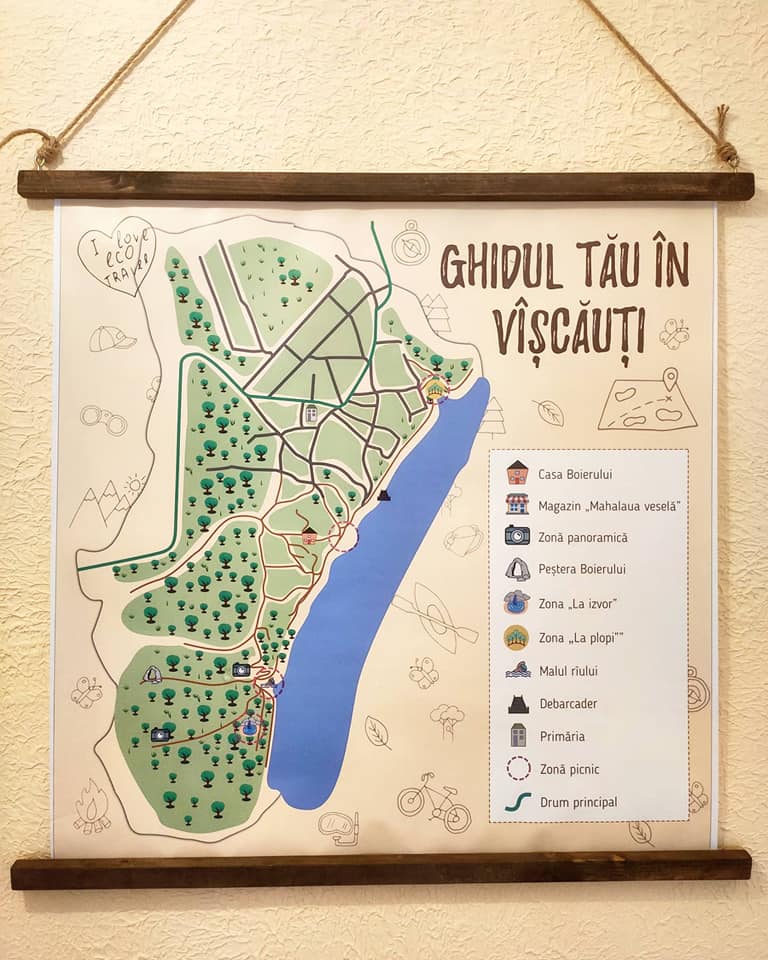
Map drawn for the tourists who visit the Boyar’s House
In Vîșcăuți you can rent a boat from the locals. You can also buy homemade bread, wine and free range chicken, fresh river fish, home grown vegetables. The village also has a beach, a picnic area, a wharf and a neighborhood called “The joyful neighborhood” due to the events organized here. From time to time, people gather here and cook fish soup or barbeque, they play some music, dance and party.
“The hill of Chirița” opens a view of Nistru river and the surrounding areas. “Now everything has dried-up… But when it’s green, the flowers there are wonderful!,” says Gheorghe.
“In Rață’s music video they showed the entire village. They filmed the forest and our meadow”, recalls Gheorghe. “There is also a song – My meadow. He sang it on TV many times,” adds Ludmila.
„Over the mountain, over the river – is my meadow,
Sometimes yearly, sometimes late – I take a walk there,
Over the mountain, over the river – flowers and roses,
Over the mountain, over the river – hidden memories.”
The lyrics to the song “My meadow”, sang by Moldovan singer Ion Rață, born in Vîșcăuți, where the music video was filmed.
Since the pandemic started, Ludmila and Gheorghe appreciate life in the village even more. “When the pandemic started, everyone was so agitated and scared. When we were in Chișinău, we would see all the ambulances and police cars throughout the entire city. But when we came here, it was like coming to heaven. When you get in the yard, you don’t need the mask any longer. We are peaceful here and we see to our chores. In Chișinău we didn’t have anything to do, except sitting on the benches outside. But here we exercise, we grow vegetables, fruits, we make canned food for winter,” Ludmila explains. She appreciates the tourists visiting the village, because the people have the opportunity to sell something to them. “They really don’t have a way to sell something in the village, no means to make a living.”
The luck and the happiness to be born at the river
Because the village is located on the banks of Nistru, the river is the one dictating the life in the region: it gives people water, it gives them food, but also leisure areas. Gheorghe remembers that especially during the soviet period he would visit his relatives on the other side of the river, in the village of Harmațca. They would barbeque under the willows near the river and then cross Nistru and continue their party under the willows of Vîșcăuți.
At the guest house, while stirring the pot roast, Lucia is humming a sad song. She is absorbed by the process and lets herself caught up in the moment:
Nistru, don’t drown me,
Nistru, don’t drown me,
Shai-rai-rai-ra, Shai-rai-rai-ra.
You don’t have the money to burry me,
You don’t have the money to burry me,
Shai-rai-rai-ra, Shai-rai-rai-ra.
“I woke up to this song. I woke up with my grandparents, with my parents, with the entire village singing it, and we learned it.” She grinds some cheese on a plate, and on another she puts some parmesan – so it’ll be tastier with the mămăliga. She puts some clay plates on the table and invites the guests.
“I am very proud to be born near the river,” says Lucia. She has happy memories of her childhood, when the winters were colder and the ice on the river could reach even 1 meter in depth. “Cars and tractors, even trucks with gas tanks would cross Nistru, driving towards the Transnistrian region,” she explains.
1 434 |
1 210 |
People live in VîșcăuțiSources: BNS, 2014 |
People live in HarmațcaSources: dubossary.ru, 2013 |
Even today, the bond between the two river banks is not lost. Lucia has relatives living in the village across the river, in Harmațca. “We have brothers and sisters, we have cousins, we are all related to each other. Because it’s a whole.”
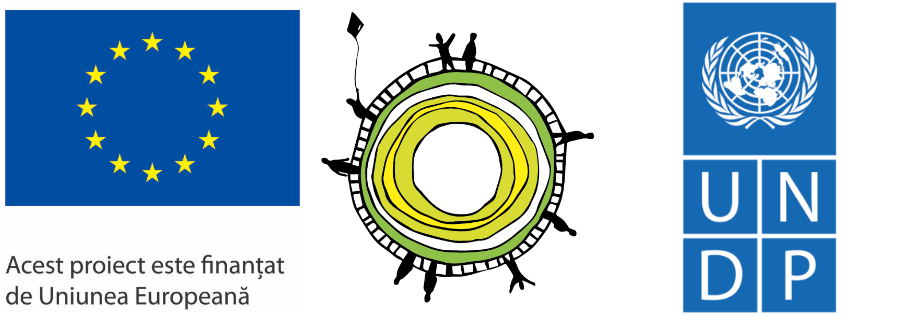
Produced with the financial support of the European Union within the “Support to Confidence Building Measures” project, implemented by UNDP. The opinions expressed in this material do not necessarily reflect the official position of the EU or UNDP.












